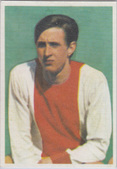
1aJohan Cruyff (NED)
1968 Palirex.
Widely regarded as one of the best football players and one of the best managers in history, Johan Cruyff is one of just three players to win the Ballon d'Or award 3 times. In 1999, IFFHS voted him European Player of the Century. With Ajax, he dominated the late 1960s and early 1970s, winning 8 Eredivisie titles and an amazing 3 Champions League titles. He helped Barcelona win La Liga in his first season with the team. Cruyff led the Netherlands to second-place at the 1974 World Cup and third-place at the 1976 European Championship. He was awarded the Golden Ball at the 1974 World Cup. Cruyff was also a highly successful manager, winning 4 consecutive La Liga titles with Barcelona.
| 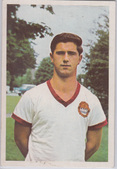
1bGerd Müller (GER)
1965 Bergmann.
One of the greatest scores in the history of the game, Gerd Müller is credited with 735 goals in official matches and averaged more than one goal per season for 7 different seasons. With Müller, Franz Beckenbauer and Sepp Maier, Bayern Munich was dominant in German and European football in the first half of the 1970s, winning 4 Bundesliga titles and 3 consecutive Champions League titles. For West Germany, Müller scored 68 goals in 62 matches, including 10 goals at the 1970 World Cup and the winning goal in the 1974 World Cup final match.
| 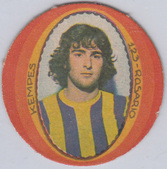
1cMario Kempes (ARG)
1974 Fulbito.
Mario Kempes is best remembered for his heroics at the 1978 World Cup where was awarded both the Golden Ball and Golden Boot (with 6 goals) and led Argentina to win the tournament. He is one of only three players to accomplish this, along with Garrincha in 1962 and Paolo Rossi in 1982. Kempes was Argentine Primera División top scorer in 1974 and 1976 and La Liga top scorer in 1977 and 1978.
|
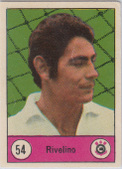
1dRoberto Rivelino (BRA)
1969 Idolos Do Robertão.
One of the most graceful football players ever, Rivelino was a key member of the 1970 World Cup winning team, often cited as the greatest-ever World Cup team. He played the majority of his career in South America and finished in the top three for South American Footballer of the Year on three occasions. With Fluminense, Rivelino won the Rio de Janeiro league championship in 1975 and 1976.
| 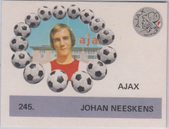
1eJohan Neeskens (NED)
1970 Monty Gum.
Johan Neeskens was a key player for the Netherlands national team that finished in third-place in the 1976 European Championship and as runner-ups at both the 1974 and 1978 World Cups. With Johan Cruyff retired from international football, Neeskens was the Netherlands’ biggest star in the latter World Cup, the team losing to Argentina in the final match in extra time. Neeskens played central midfield for Ajax and Barcelona, supporting Johan Cruyff at both clubs. With Ajax, he won two Eredivisie titles and three consecutive Champions League titles.
| 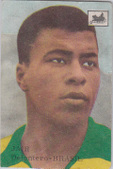
1fJairzinho (BRA)
1966 Cholates La Cibeles.
A member of the legendary Brazilian team that on the 1970 World Cup, Jairzinho scored in every game Brazil played in the tournament. He is one of only two players to do this (the other was Alcides Ghiggia). A high-speed winger, his scintillating pace turned defenses inside out, exposing the opponents’ goalkeepers. Jairzinho played in three World Cups for Brazil, but it was when Garrincha retired after the 1966 World Cup and Jairinzo was able to switch to right-winger role that he became particularly lethal.
|

1gDaniel Passarella (ARG)
1975 Jugadores.
Captain of 1978 World Cup-winning Argentina, Daniel Passarella is widely considered Argentina's all-time greatest defender. He was a top defender who often joined in the attack. His 134 goals was a world record for a defender, until broken by Ronald Koeman. Passarella won the World Cup with Argentina, both in 1978 and in 1986, and 6 titles with River Plate.
| 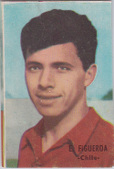
1hElias Figueroa (CHI)
1966 Editorial Fher.
Arguably the best South American defender of all time, Elias Figueroa was awarded the South American Footballer of the Year three times in a row by Venezuelan newspaper El Mundo in 1974, 1975 and 1976. He won two league titles in Uruguay with Peñarol, two in Brazil with Internacional and one in his native Chile with Palestino. He was noted for his elegant style of play, his calmness in the center of defense and his ability to stop opposition attacks and immediately launch counter attacks from the back.
| 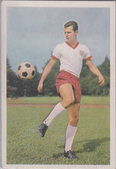
1iFranz Beckenbauer (GER)
1965 Bergmann.
Franz Beckenbauer is widely considered the best defensive football player of all time, one of the best German players of all time and one of the best managers of all time. His 10 appearances in the top five of Ballon D’or voting is a record. Beckenbauer won 5 Bundesliga titles and 3 consecutive Champions League titles with Bayern Munich and 3 NASL titles with the New York Cosmos. Capped 103 times for West Germany, he was a key member of the team that won the 1974 World Cup.
|
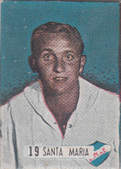
1iJosé Santamaria
1950 Goles y Dobles.
One of the all-time greatest central defenders, José Santamaria won five Uruguayan league titles with Nacional and six La Liga titles with Real Madrid. He is considered Real Madrid’s all-time best defender. Santamaria was capped 20 times by Uruguay and 16 by Spain, helping the former team finish fourth at the 1954 World Cup.
| 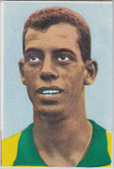
1jCarlos Alberto Torres (BRA)
1966 Verlag Weltmeisterschaft.
Carlos Alberto is regarded by some experts as the best right-wing back of all time due to his excellent ball control, dribbling, playmaking ability, brilliant positioning, great tackling and reading of the game. He captained the 1970 Brazilian national team that won the World Cup. He won 4 Paulista Championships with Santos and 4 NASL titles with the New York Cosmos.
| 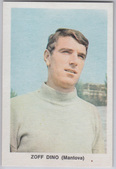
1kDino Zoff (ITA)
1963 Stef Campionato.
The oldest winner ever of the World Cup at age 40, Dino Zoff captained Italy and was named best goalkeeper at the 1982 World Cup. He achieved great club success with Juventus, winning 6 Serie A titles and 2 Italian Cups and reaching two Champions League finals. IFFHS named Zoff the third best goalkeeper of the 20th Century after Lev Yashin and Gordon Banks.
|
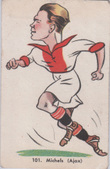
1lManager: Rinus Michels (NED)
1950 Spark Sportparade.
Considered by many the best manager of all time, “The Commander” Rinus Michels is credited with the creation/perfection of “Total Football.” FIFA named him the Coach of the Century in 1999. Michels started his career as Ajax Amsterdam’s manager in 1965 and led the club from relegation candidate to Eredivisie champions in his first season. He won 4 league titles and one Champions League title with Ajax and built the team to continue to dominate Netherlands and European football in the early 1970s. With Johan Cruyff playing for him, he guided Barcelona to a La Liga title in 1973. Michels famously coached the Netherlands national team to second-place at the 1974 World Cup. Later in his career, he returned to coach the national side to victory Euro 88. From 1946 to 1958, Michels played as a striker for Ajax, scoring 122 goals in 264 matches, and was capped 5 times by the Netherlands national side.
| 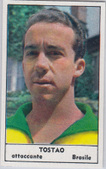
2aTostão (BRA)
1966 Tempo.
Tostão was a starting forward for the 1970 Brazilian national team, often cited as the greatest World Cup team in history. Between 1964 and 1971, he scored 249 goals for Cruzeiro despite playing as its central midfielder. Legend has it that, as a six-year old, Tostão once scored 47 goals in a single game for his primary school football team.
| 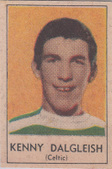
2bKenny Dalglish (SCO)
1970 Rover Comic.
Scotland’s joint all-time scorer and most-caped player of all-time, Kenny Dalglish has been named the greatest striker in post-war British football. He began his career with Celtic where he won 4 Scottish First Division titles and 4 Scottish Cups. But “King Kenny” is most famous for succeeding Kevin Keegan as Liverpool’s star striker and winning 6 Premier League titles and 3 Champions League titles in the late 1970s/early 1980s. Dalglish finished second in Ballon d'Or voting in 1983.
|
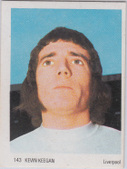
2cKevin Keegan (ENG)
1972 Soccer Parade.
Kevin Keegan is the only British footballer player win multiple Ballon d’Or awards. Keegan preceded Kenny Dalglish as Liverpool’s star striker led the club to 3 Premiere League titles and one Champions League title. He was even better with Hamburg with which he won the Bundesliga title in 1978–79 and reached the Champions League final in 1980. Keegan was also a successful manager, winning promotion for Newcastle, Fulham and Manchester City as First Division champions in his first full season at all three clubs.
| 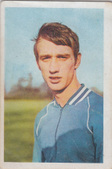
2dRob Resenbrink (NED)
1968 Vanderhout.
A member of the Netherlands national sides that reached the 1974 and 1978 World Cup finals, left winger Rob Rensenbrink was a talented dribbler and great finisher. He was a legend in Belgium where he led Anderlecht to win 2 league titles, 5 Belgium Cups and 2 UEFA Cup Winners' Cups. Rensenbrink took home the Silver Boot award at the 1978 World Cup after scoring 5 goals.
| 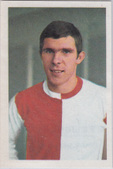
2eWillem van Hanegem (NED)
1969 Vanderhout.
One of the most complete box-to-box midfielders, Willem van Hanegem was a key player on the Netherlands national team that finished runner-up in the 1974 World Cup and finished third at the 1976 European Championship. Playing for Feyenoord, he won 3 Eredivisie (at a time when Ajax was otherwise dominant) and the 1970 Champions League. Also a successful manager, van Hanegem won another Eredivisie with Feyenoord as a manager in 1993.
|
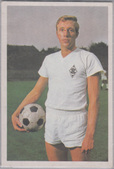
2fGünter Netzer (GER)
1965 Bergmann.
Known for his perfect passing, Gunter Netzer started his senior career at Borussia Mönchengladbach, with which he won the Bundesliga in 1970 and 1971. That was no small feat considering rivals Bayern Munich had Gerd Muller, Franz Beckenbauer and Sepp Maier. Netzer played 3 seasons for Real Madrid, winning La Liga in 1975 and 1976, and the Copa del Rey in 1974 and 1975.
| 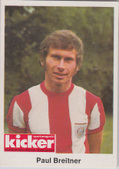
2gPaul Breitner (GER)
1970 Kicker.
Known for his partnerships with Franz Beckenbauer and Berti Vogts in defense for the West German national team and with Karl-Heinz Rummenigge in the midfield for Bayern Munich, Paul Breitner was an integral part of both teams. He won 5 Bundesliga titles with Bayern and 2 La Liga titles with Real Madrid. Breitner was a key member of the West German teams that won the 1974 World Cup and were runners-up at the 1982 World Cup. Breitner scored a goal in the final match of both tournaments, one of only four players to do so.
| 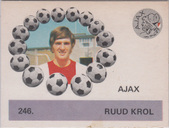
2hRuud Krol (NED)
1970 Monty Gum.
One of the best defenders of his generation, Ruud Krol played primarily as a sweeper or left-back. Hey was a key member of the Ajax sides that won 6 Eredivisie titles and three consecutive Champions League titles. Krol was also a key member of the Netherlands national side that finished as runner-up at the 1974 and 1978 World Cup tournaments and third-place t the 1976 European Championship.
|
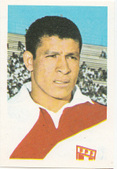
2iHéctor Chumpitaz (PER)
1970 FKS.
One of the best South American defenders of all time, Héctor Chumpitaz captained Peru national team at the 1970 and 1978 World Cups, and at Copa America 1975 which Peru won. He won 5 Peruvian League titles with Universitario and 3 with Sporting Cristal.
| 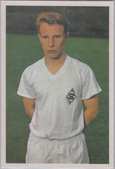
2jBerti Vogts (GER)
1965 Bergmann.
Right-back Berti Vogts played his entire career with Borussia Mönchengladbach, winning 5 Bundesliga titles, one German Cup and 2 UEFA Cups. His tenacity earned him the nickname "Der Terrier.” He was a key member of the West Germany national team that won the 1974 World Cup. In the final match versus the Netherlands, Vogts marked Johan Cruyff and kept him from scoring.
| 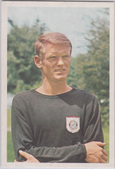
2kSepp Maier (GER)
1965 Bergmann.
Along with Franz Beckenbauer and Gerd Muller, Sepp Maier was a key member of the Bayern Munich team that won 5 Bundesliga titles and 3 consecutive Champions League titles. Between 1966 and 1979 he played in 442 consecutive Bundesliga matches, still a German national record. He was selected by the West German national team for 4 consecutive World Cups, winning the 1972 European Championship and the 1974 World Cup.
|

2lManager: Ernst Happel (NED)
1958 Biscuits Rem.
Ernst Happel is regarded as one of the most successful managers ever, winning both league and domestic cup titles in the Netherlands, Belgium, Germany and Austria as well as winning the Champions League twice, the first in 1970 with Feyenoord and the second in 1983 with Hamburger, and a runners-up medal at the 1978 World Cup. He is one of only five managers to win Champions League with two different team. In total, Happel won 5 Austrian league titles as a players and 8 league titles as a manager.
| 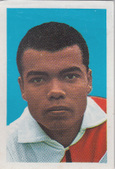
3aTeófilo Cubillas (PER)
1970 FKS.
Voted Peru’s greatest-ever footballer in a 2000 IFFHS poll, attacking midfielder Teófilo Cubillas was a member of the Peru national team that reached the quarter-finals of both the 1970 and 1978 World Cups and won the 1975 Copa América. He is the all-time leading scorer for his country with 26 goals in 81 matches. Cubillas is one of only three players to score five or more goals in two different World Cups.
| 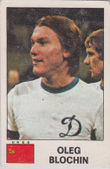
3bOleh Blokhin (UKR)
1975 Panini.
Oleh Blokhin holds the all-time top goalscorer record for both Dynamo Kyiv (266 goals) and the Soviet Union national team (42 goals), as well as being the overall top goalscorer in the history of the Soviet Top League (211 goals). With Dynamo, he won 8 Soviet League titles, 5 national cups and 2 European Cup Winners’ Cups. He won the Soviet Footballer of the Year award 3 times and the Ukrainian Footballer of the Year award 9 times, both records. Blokhin was capped 112 times by the Soviet Union.
|
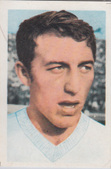
3cNicolae Dobrin (ROM)
1970 Lampo.
Romania's greatest footballer, Nicolae Dobrin was one of the most talented dribblers ever to play football. During club career, Dobrin played 409 matches, scoring 111 goals. He was named Romanian Player of the Year in 1966, 1967 and 1971. Real Madrid attempted to recruit him in 1973, however, Romania’s communist government disallowed the transfer. Dobrin was capped 46 times by the Romanian national team and helped his country qualify for the 1970 World Cup.
| 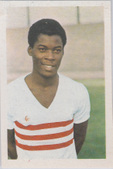
3dMarius Trésor (FRA)
1970 Etoiles du Football.
Defender Marius Trésor was capped 65 times by France, starting at the 1978 and 1982 World Cups. He won the French Cup in 1976 playing with Olympique de Marseille and won a Ligue 1 title in 1984 with Girondins de Bordeaux.
| 
3ePat Jennings (IRE)
1965 Barratt.
In a career marked by both top play and longevity, Pat Jennings made over 1,000 top level appearances, playing across two decades at both the club and national levels. He was named Football Writers' Association Footballer of the Year in 1973 and voted 13th World’s best goalkeeper of the 20th Century by an IFFHS poll in 2000. Jennings was capped 119 times by Northern Ireland.
|
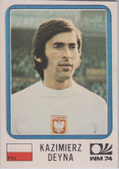
3fKazimierz Deyna (POL)
1974 Panini.
One of the top offensive midfielders of his generation, Kazimierz Deyna led Poland to a gold medal at the 1972 Olympics, where he led all scorers in the tournament with 9 goals , and a silver medal at the 1976 Olympic games. He led Poland to an incredible third-place finish at the 1974 World Cup. With Legia Warsaw, Deyna won the Polish Championship in 1969 and 1970.
| 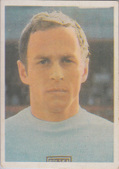
3gGrzegorz Lato (POL)
1974 Bergmann.
Winner of the Golden Boot at the 1974 World Cup with 7 goals, Polish winger Grzegorz Lato was a key Polish player during the Golden Era of Polish football. With Lato, Poland finished first and second, respectively, at the 1972 and 1976 Olympics, and in third place at both the 1974 and 1982 World Cups. Lato was the top goal scorer in the Polish Premier League in 1973 and 1975.
| 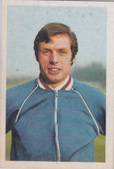
3hWim Suurbier (NED)
1968 Vanderhout.
Wim Suurbier played right back for the famed 1970’s Ajax team that won seven league titles and three Champions Leagues. Suurbier was capped 60 times by the Netherlands national team and was a key player on the squads that finished second at the 1974 and 1978 World Cups.
|
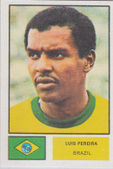
3iLuís Pereira (BRA)
1974 FKS.
Considered one of the best defenders in Europe during the late 1970s, Luis Pereira won three Brazilian championships and one Spanish League championship. He was capped 32 times by Brazil.
| 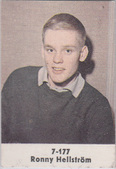
3jRonnie Hellstrom (SWE)
1967 Coralli.
Considered one of the best goalkeepers of the 1970s, Ronnie Hellström wa voted Sweden’s best overall footballed in 1971 and 1978. He helped Sweden to a fifth-place finish at the 1978 Word Cup.
| |